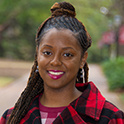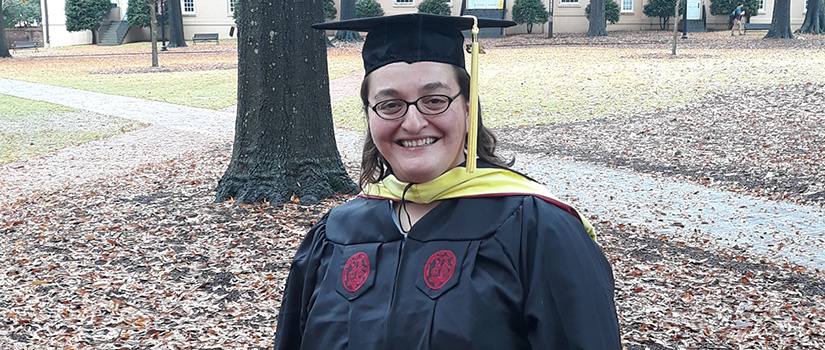Posted June 27, 2019
By Shenika Glover, communications graduate assistant
In January, Margarita “Dee” Demetriadis (MLIS, ’18) was promoted from part-time assistant
to teen/digital media lab librarian at the Libbie Mill Library in Henrico, Virginia.
From networking opportunities to real-world projects, Demetriadis says the keys to
landing her dream job were the opportunities she found at SLIS. Read more about her
career and how her alma mater paved the way for her to get there.
What do you do as teen/digital media lab librarian?
Libbie Mill Library just opened in 2015, so our building is new and modern with up-to-date
library trends, tech and services. We have our own designated Teen Room with video
games, computers and study rooms. Also, we run a separate Digital Media Lab (DML)
that is open to the entire public. The DML includes a variety of equipment and resources
for our patrons to use for free (podcasting kits, Adobe Creative Suite, scanners,
green screen and much more). In addition, we create and host programs and classes
that work to assist patrons in both spaces as needed. Also, we have creative interactive
displays, user guides, department flyers and brochures, and calendars. There are also
occasional tasks such as projects for the system, committee meetings and outreach
opportunities.
We kind of do what we want (within reason) insofar as programming ideas. I run an
improv program series for teens because that is something I do in my personal time,
while another artistic staff member runs our teen art club. The beauty of this job
is that we get to put a bit of ourselves into it.
How has your degree prepared you for this position?
I was hired as a part-time assistant in this department in the same month as being
accepted into the SLIS program at the University of South Carolina. Being able to
pursue my degree while also working in a library — and a brand-new one at that! —
was a major benefit to me. Information I learned in my studies helped me to better
perform in my work — and vice versa. I focused several grad school projects on my
library and its offerings so that my school work had a real-world benefit. The (former)
department librarian had me do tasks that aligned with my classes. The scaffolding
of school and work together made me feel more prepared to work in my new position,
which happened sooner than I ever expected.
Tell us about your independent study.
I chose to focus my study on observing library programming for children, tweens and
teens in two different library communities and systems. One library was located in
an affluent community out in the suburbs. The other library was closer to the city
and in a lower-income community.
My independent study is what created local networking opportunities for me. I reached
out to both libraries, got permission to observe, researched their program calendars
and scheduled out my visits for the next two to three months. I visited each location
at least five times and also sat down for extended interviews. I wound up getting
along very well with all the librarians I met and we spoke at length during several
of my visits. I learned a lot about the inside workings of the two other major library
systems in my area. I also saw how each branch adapted their programming to fit their
community’s needs. On the flip side, they liked getting insight into my library system
and what we had going on as well.
Dr. Karen Gavigan supervised my independent study and arranged for me to network with
teen librarians in other states as well. I was able to speak at length with Thomas
Maluck, the teen services librarian at the Richland Library downtown branch. I was
even able to meet him in person when I came to Columbia for my hooding ceremony. We
met at the branch and he took me on a tour and before I knew it, I had been there
for two hours. I also had an extended phone interview with Cearra Harris, a teen library
services specialist from ImaginOn, which was a real treat as I’ve known about ImaginOn’s
work for several years now.
What advice do you have for current SLIS students?
If you’re like me and do better with projects than on tests, you’ve come to the right
school! Also, many of your professors had to go through the same program as well,
so they will help when you need questions answered or a better understanding of an
assignment. Several professors were great in working with me when I needed flexible
due dates because of personal life circumstances. I have always bragged to others
about how nice it is to go to grad school because I’m always treated like an adult.
What advice would you share with current students who are in search of networking
opportunities?
It’s really true: Just chatting with other librarians is one of your best resources
for networking. Find them at other libraries or at professional gatherings. Kudos
when you find the people who you really hit it off with both on a personal and professional
level — it’s worth its weight in gold! If you are socially anxious, join a Facebook
library-centric group — there are many out there, full of active discussion and ideas!
Do you have a favorite professor or a favorite memory from your time here?
Dr. Clayton Copeland and Dr. Gavigan were both big influences on me during my time in this program. I
had two classes with Dr. Copeland and with Dr. Gavigan, who was both a professor and
my advisor. Both women are smart, hardworking, supportive and knowledgeable professionals.
Is there anything you’d like to share that we didn’t ask?
I decided to become a librarian during a major crossroads moment in my life. It is
the best decision I ever made. I am now working in what is basically my dream job
with amazing coworkers and resources. I will always be grateful to UofSC for teaching
me the knowledge, methods, ethics and tools to help make it happen.

Shenika A. Glover
Shenika Glover is pursuing her master's degree in mass communications at the School
of Journalism and Mass Communications. Currently, she works as a graduate assistant
for the college and is a social media intern for the Millennial FM 95.9 radio station
in Columbia.

